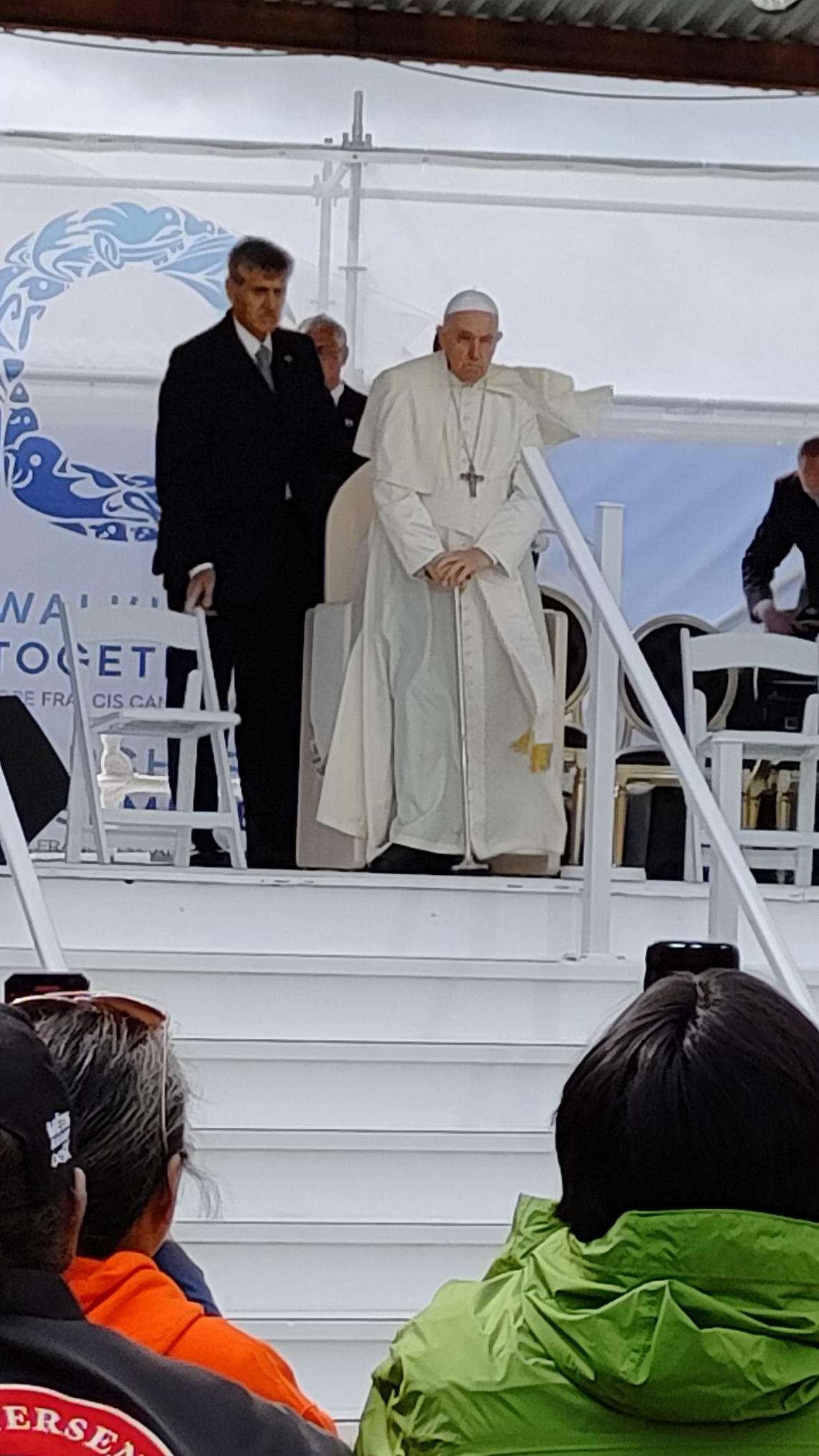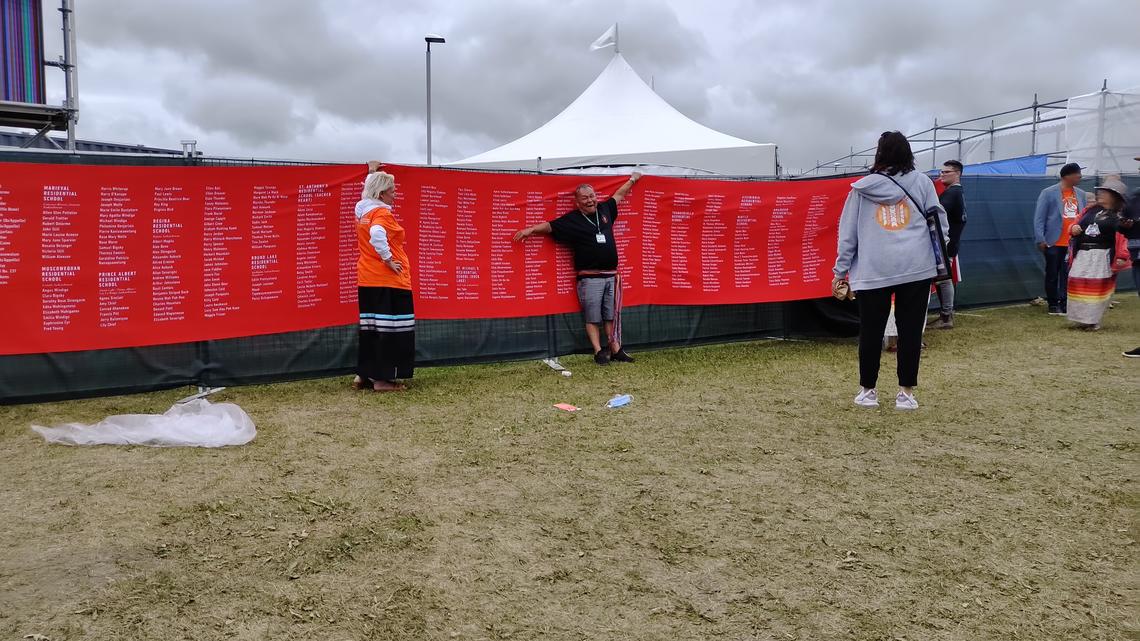Sept. 29, 2022
UCalgary sociologist and residential school survivor on path forward for truth and reconciliation

When recalling her experience in a residential school at the age of nine, sociology professor Cora Voyageur first describes herself as lucky, then immediately corrects herself, because it’s impossible to frame the memory as anything other than traumatic.
But she does feel fortunate that her time spent at Holy Angels Indian Residential School in Fort Chipewyan, Alta, in the mid-'60s only amounted to a year, unlike so many Indigenous survivors who spent their entire childhoods in residential schools.
Dr. Voyageur, PhD, who spoke at an Orange Shirt Day panel discussion in the Rozsa Centre Friday, is also grateful that she wasn’t alone at the school.
“I had two sisters there, so there was that human touch,” she says. “Because there was no affection shown. There was never anybody giving encouragement, a cuddle, a hug. It was a joyless existence.”

Sociology professor and residential school survivor Cora Voyageur
Voyageur will never forget the time that her six-year-old sister fell ill and was taken from the school, flown to a remote hospital overnight.
“I woke up asked the nun, ‘Where’s my sister?’ And she refused to tell me. Those nuns were so wicked and twisted. Every night I would go to sleep, hoping and praying she would show up, and every morning I would check her bed and see she wasn’t there.”
Thankfully, Voyageur’s sister eventually returned from her hospital stay.
Voyageur says that her time at the school felt like jail. “On one hand, things were just monotonous, but there was always this unease, this negative electricity all around you, because you never knew when the other shoe was going to drop,” she says. “The only certainty was that sooner or later, you were going to be punished.”
Among the topics Voyageur and her fellow panellists discussed at the Orange Shirt Day talk was Pope Francis’s time in Canada last summer, when he made an apology to Indigenous Peoples for the abuses inflicted by the church-run residential school system in light of unmarked graves discovered near so many former residential schools.
At present, over 4,000 Indigenous children have been identified as having died in residential schools. It’s expected that number will climb as further sites are excavated.
Voyageur is eminently qualified to speak on the matter as she was part of a group called the Indian Residential School Survivors Circle who drafted the apology they wanted to hear, which was sent to the team of Pope Francis.
Voyageur appreciated the papal visit and the statements he made, but she doesn’t feel they went far enough. She attended the Pope’s first Canadian stop, at a former residential school in Maskwacis, Alta., and bristled when he didn’t make his apology on behalf of the Catholic Church. He also neglected to mention the sexual abuse that occurred at the residential schools.
“He listed off psychological, emotional, and physical abuse, but he didn’t mention sexual abuse,” says Voyageur. “And the information we sent him stated that sexual abuse was rampant. That’s one area where he really missed the mark.”
As a sociologist who has spent her career focused on Indigenous issues in Canada, including the troubling prevalence of First Nations Peoples in the criminal justice system, Voyageur is expertly versed on the legacy of trauma and multigenerational damage caused by the residential school system.

Pope Francis appears in the summer of 2022 at the site of a former residential school in Maskwacis.
Cora Voyageur.
Always an ambitious researcher, Voyageur currently has several projects in the works. Among them is an analysis of truth and reconciliation movements around the world, including Canada, Ireland, and South Africa.
She’s also researching the health of aging women in Indigenous communities, as well as a study on First Nations chiefs in Canada, for which she’s been compiling data for close to a decade, interviewing 164 chiefs across the country. She plans to do a gender-based analysis of her findings to determine the different working experiences of female chiefs to that of their male counterparts.
A key topic for the panel discussion was the path forward for truth and reconciliation, following the discovery of the unmarked graves and the papal visit.
“I think this is going to be a very long walk,” says Voyageur. “I don’t know if we’ll get where we need to be in my lifetime, because there’s so much healing that has to happen.”
For now, Voyageur stresses the crucial importance of hearing more Indigenous voices and perspectives in schools, the media, and other societal institutions.
“Let’s look at the huge contributions of Indigenous Peoples, both historically and to contemporary society, in areas such as land and resource development, business ownership, and entrepreneurial spirit,” she says.
Voyageur also recommends that people can show their support for truth and reconciliation by educating themselves, going to talks, or participating in marches. And she hopes that compassion, patience, and understanding be shown to residential school survivors and their families.
“I see my role in this as helping to educate people,” she says. “Some are happy to learn, while others might feel angry or guilty. Some feel like they’re being shamed or made to feel bad. That’s certainly not my intention.”
She adds: “We don’t have to like our history. But we should strive to learn from it, so we don’t make the same mistakes again.”

A banner seen here at Maskwacis during the visit of Pope Francis bears the name of over 4,000 Indigenous children who died in residential schools.
Cora Voyageur
ii’ taa’poh’to’p, the University of Calgary’s Indigenous Strategy, is a commitment to deep evolutionary transformation by reimagining ways of knowing, doing, connecting and being. Walking parallel paths together, “in a good way,” UCalgary is moving toward genuine reconciliation and Indigenization.





